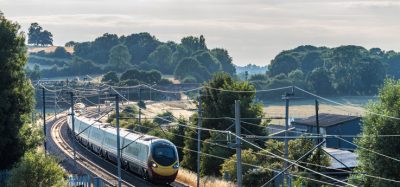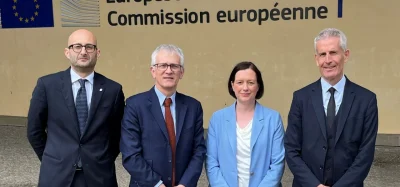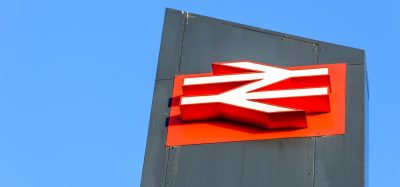Securing a sustainable future for rail travel in Northern Ireland
Posted: 29 November 2012 | | No comments yet
In 2011/12, Translink NI Railways recorded its highest ever passenger numbers with 10.7 million journeys made on local rail services in Northern Ireland – an increase of over 70% in the last decade.
Independent research released in September shows that Translink customers continue to rate local rail services very highly – NI Railways achieved 100% ‘on time’ scores for the second consecutive monitor and beat reliability targets.
This impressive trend shows no sign of slowing down with a range of significant developments in rail infrastructure, technology and services securing a bright future for train travel in the country.
Translink’s ‘New Trains Two’ programme has now successfully completed the delivery of 20 new Class 4000 trains manufactured by CAF in Zaragoza, Spain.
All trains in this £114 million investment are now in passenger service and operate alongside 23 Class 3000 trains to deliver an entirely modern fleet for growing passenger demand. In fact, NI Railways has one of the most modern fleets of DMUs in Europe with all units manufactured over the past 10 years.
In 2011/12, Translink NI Railways recorded its highest ever passenger numbers with 10.7 million journeys made on local rail services in Northern Ireland – an increase of over 70% in the last decade. Independent research released in September shows that Translink customers continue to rate local rail services very highly – NI Railways achieved 100% ‘on time’ scores for the second consecutive monitor and beat reliability targets. This impressive trend shows no sign of slowing down with a range of significant developments in rail infrastructure, technology and services securing a bright future for train travel in the country. Translink’s ‘New Trains Two’ programme has now successfully completed the delivery of 20 new Class 4000 trains manufactured by CAF in Zaragoza, Spain. All trains in this £114 million investment are now in passenger service and operate alongside 23 Class 3000 trains to deliver an entirely modern fleet for growing passenger demand. In fact, NI Railways has one of the most modern fleets of DMUs in Europe with all units manufactured over the past 10 years.
In 2011/12, Translink NI Railways recorded its highest ever passenger numbers with 10.7 million journeys made on local rail services in Northern Ireland – an increase of over 70% in the last decade.
Independent research released in September shows that Translink customers continue to rate local rail services very highly – NI Railways achieved 100% ‘on time’ scores for the second consecutive monitor and beat reliability targets.
This impressive trend shows no sign of slowing down with a range of significant developments in rail infrastructure, technology and services securing a bright future for train travel in the country.
Translink’s ‘New Trains Two’ programme has now successfully completed the delivery of 20 new Class 4000 trains manufactured by CAF in Zaragoza, Spain.
All trains in this £114 million investment are now in passenger service and operate alongside 23 Class 3000 trains to deliver an entirely modern fleet for growing passenger demand. In fact, NI Railways has one of the most modern fleets of DMUs in Europe with all units manufactured over the past 10 years.
The fleet has already started to deliver a step change in service reliability and improved accessibility. Translink is now in a position to offer over 20% additional seating capacity by doubling busy morning and afternoon commuter trains from three to six cars.
Responding to changing passenger expectations remains a key Translink priority and in autumn 2012, free Wi-Fi was launched on all local rail services and will be available on crossborder Enterprise train services between Belfast and Dublin from the end of October 2012.
We have continued to focus on best value with a range of innovative products such as mLink and iLink tickets offering customers more choice and flexibility. We also launched yLink ticket in summer 2012 for 16-23 year olds providing discounts on fares across Translink bus and rail services.
Investment in infrastructure
To maximise the potential of this modern new fleet, we remain committed to rail network renewal with the first phase of work to upgrade the Coleraine–Londonderry rail line underway and scheduled for completion in April 2013. Phase 2 of the upgrade work will then be completed following the Derry~Londonderry City of Culture celebrations in 2013.
Other recently completed work included the upgrade of the Coleraine–Portrush line to deliver more comfortable journeys, the 70mph line speed, line reliability and to maintain high safety standards.
With on-going development in the Belfast docks area including the opening of a flagship Titanic Signature Building & Visitor Centre, we have also upgraded Bridge End Rail Halt in East Belfast to make it fully accessible in compliance with the Disability Discrimination Act. To maximise the visitor potential of the area, the halt was also renamed to ‘Titanic Quarter Station’.
In addition, £3.6 million and £2.3 million investment projects are also underway at Portadown and Antrim Railway Stations respectively, which served over 1.2 million passengers during 2011/12. Ballymoney Station is also undergoing a £1.3 million investment project to construct a new fully accessible pedestrian and cycle bridge that will provide improved access to station platforms and additional Park & Ride spaces which is a key priority in terms of providing commuters with meaningful transport integration.
Several associated projects are now underway in line with the new Class 4000 trains’ arrival to ensure infrastructure is in place to accommodate the new fleet. Platforms are being extended at 19 stations and halts across the network to accommodate longer trains, enhancing on-board capacity.
A new train maintenance facility at the former Adelaide freight yard in South Belfast is also in the final stages of construction and will be an important addition to Translink’s rail network.
Adelaide Train Maintenance Facility
The £27.8 million Adelaide Train Maintenance Facility is due for completion in autumn 2012. It will feature an engineering depot, office and workshop facilities, fuelling facility, train wash, stabling facilities and material storage area for NI Railways CAF trains.
The new facility will operate in conjunction with existing train cleaning and maintenance facilities based in North Belfast that are operating at or close to full capacity. The new facility sits on the same site as Translink’s Customer Contact Centre and Rail Operations Training Academy.
The Maintenance Building accommodates two maintenance roads providing maintenance access above and below the trains and includes a bogie maintenance facility featuring six 20t capacity Jacks.
The fuelling facility accommodates two trains at any one time with all fuel and lubricants stored on-site in a newly constructed tank farm. This set-up enables road trucks to navigate the farm without interfering with track and site safety.
The facility is also equipped with a train wash comprising four sets of brushes and full water recycling systems.
Adjacent to the main depot building, train stabling is provided for 10 trains. There is also space allocated for general NI Railways’ material storage and 70 car-parking spaces.
A new office facility will also meet the requirements of employees based on-site with catering, showering and meeting facilities all available.
Community engagement
Testing and commissioning of the new facilities took place over the summer, and we delivered a public safety communications campaign to appeal to the public to act responsibly near the construction site.
With the site situated in an urban area, community liaison has been paramount to achieve public support and prevent delays in construction. Both Translink and local contractor Graham Construction have worked together throughout the project to engage with local political and community representatives to secure understanding and support for the important project.
This included site visits from the Minister for Regional Development (responsible for public transport in Northern Ireland), Members of the Local Assembly (MLAs) and local school children to view works first-hand and meet directly with both Translink representatives and contractors. This effective engagement approach even included the presentation of planter boxes and a work bench made from recycled construction site materials to a local primary school.
Environmental focus
Adelaide includes many environmental features such as a high percentage of low carbon concrete and Graham Construction has also implemented a number of initiatives on-site to reduce waste to landfill, through recycling and composting. This has resulted in up to 99% of site waste being reused or recycled each month. The facility is currently on course to achieving a ‘very good’ rating under the BREEAM scheme.
In addition, a grey water harvesting system collects water which is used for the train wash, and roof solar panels heat the new kitchen facilities. A noise barrier has also been placed between the facility and a neighbouring residential area.
A ‘Swift Tower’ will also be erected on-site in line with Translink’s Biodiversity Action plan – an important strand of its overall Environmental Strategy. Translink’s Group Chief Executive, Catherine Mason, is also the Business in the Community (Northern Ireland) Biodiversity Champion.
Future steps
Looking ahead, Translink is currently consulting on its plans to introduce a new improved rail timetable for NI Railways services before the end of the year. Developments are proposed across each of the NI Railways lines with increased frequency on the Larne Line and Derry~Londonderry Line between Coleraine and Belfast.
It is clear that through investment in rail infrastructure, services and technology, Translink NI Railways is working hard to secure continued growth in passenger numbers and deliver its vision for integrated travel solutions that are attractive, sustainable and good value.
About the author
Clive Bradberry has 26 years of experience in the delivery of public transport ranging from heavy rail, metro and light-rail projects to tendered bus services. He joined London Underground as a Graduate Civil Engineer in 1986 and was involved in the design and construction of major works. In 1996 Clive transferred to Transport for London and became Project Manager for the £200 million Croydon Tramlink PFI scheme. Once Tramlink was operational, Clive moved to London Buses Limited to gain operational experience as the Performance Delivery Manager for all bus services in south London. Upon moving to Northern Ireland in 2001, Clive spent the first 18 months commuting back to GB to work for Network Rail on a variety of projects. Finally, in 2003, Clive became the Infrastructure Executive for Translink, heading a Division of approximately 200 staff with responsibilities for all stations, depots, garages, track, signalling and structures used to deliver bus and rail public transport services in Northern Ireland.








